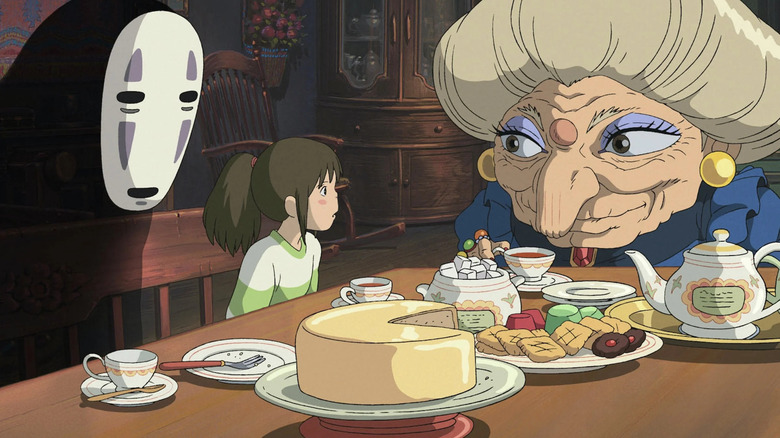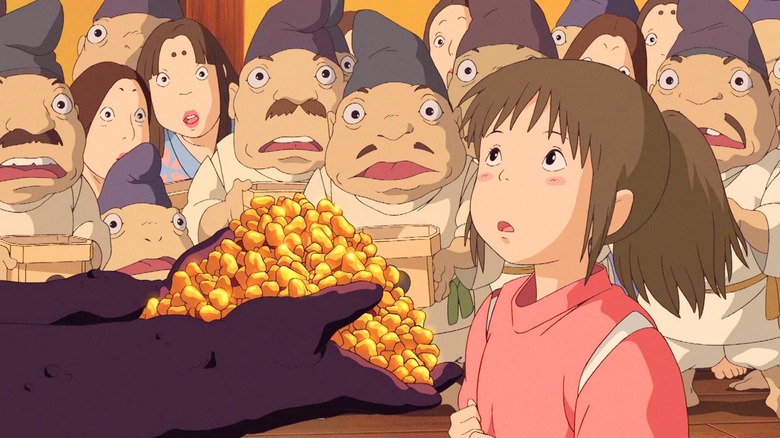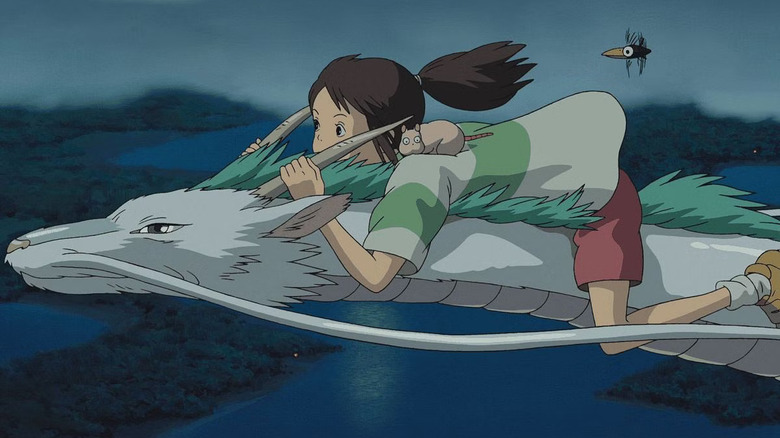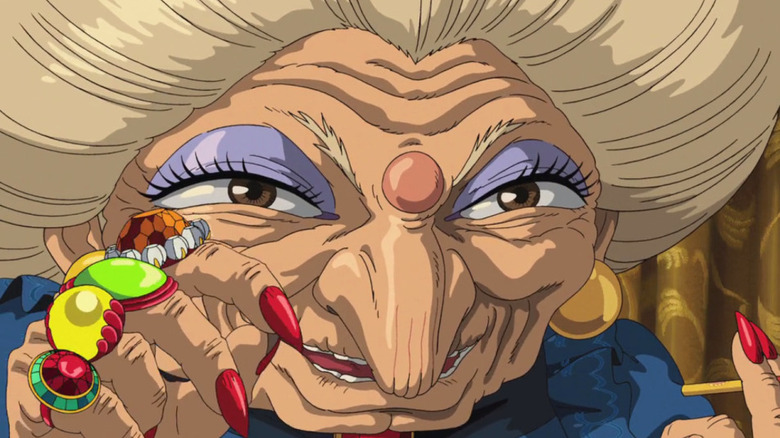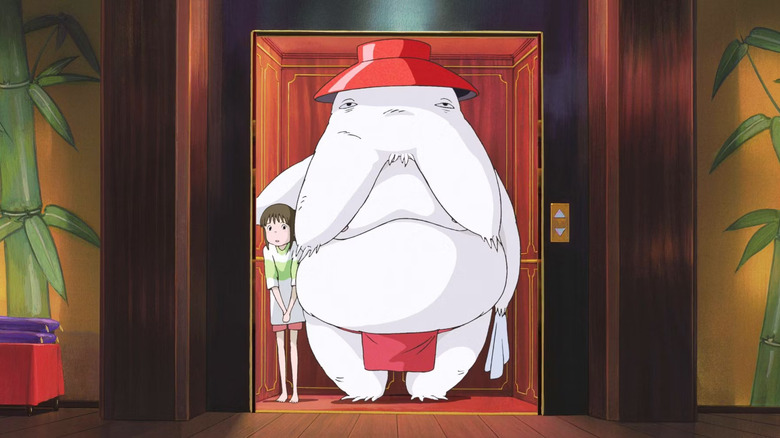The Many Monsters, Spirits, And Kami In Studio Ghibli's Spirited Away Explained
Hayao Miyazaki's 2003 fantasy film "Spirited Away" is set largely in a bathhouse reserved for itinerant spirits and traveling minor deities. In the world of "Spirited Away," gods, sprites, and other magical beings from Japanese folklore accumulate a great deal of filth and weariness in their travels, and occasionally have to rest and wash up at a local spa. The spa is usually only visible to spirits, and is run by the tyrannical and terrifying Yubaba, a large-headed witch. Yubaba enslaves the young Chihiro, changes her name to Sen, and forces her to work in the spa. While there, Chihiro interacts with human-shaped co-workers, and serves a wide variety of magical beings she cannot fathom.
The creatures in "Spirited Away" are all wholly original creations, invented by Miyazaki specifically for the movie. It's a credit to the director and the other filmmakers that all of the deities on display feel ineffably old, as if they escaped from obscure corners of ancient Japanese lore, already fully formed. One might swear, for instance, that they had encountered susuwatari — soot sprites — in their studies before. It seems that susuwatari were invented for Miyazaki's 1988 movie "My Neighbor Totoro," and were merely reused for "Spirited Away." They later met Grogu aka Baby Yoda in a Disney+ animated short.
Many of the other creatures from "Spirited Away" are directly inspired by elements of actual folklore, however. Indeed, a lot of the images and ideas come directly from Shinto iconography. Here is a brief list of the gods, creatures, and concepts that inspired "Spirited Away."
Kamikakushi
The original Japanese title of "Spirited Away" is (when Romanized) "Sen to Chihiro no Kamikakushi." The word "Kamikakushi" might be translated as "to spirit away," but is more literally said as "hidden by kami," kami being spirits. The word is a folkloric term pertaining to missing children. If a child ever vanishes, they are said to be hidden by spirits. The idea of gods removing human beings from Earth is an ancient idea that spans the entire globe; there are similar stories that one can find in the Old Testament, for instance.
"Spirited Away" begins when Chihiro/Sen explores a seemingly abandoned marketplace with her parents. She is scared, but her parents, hungry, begin eating some unattended food that has been left on a counter. Chihiro wanders off and finds that he is among barely visible creatures. She returns to her parents to find they have turned into pigs. They are taken to the godlike spa, and she goes in pursuit. She begs Yubaba for a job so that she might have access to her pig parents and perhaps restore them someday. Her parents are gone, and she was taken by gods. "Spirited Away" tells the tale of what happened during a kamikakushi.
Haku
When Chihiro first goes to the enchanted bathhouse, she encounters a young man, about her age, who — panicked — rushes in to help her and assure her that she, a human, can enter the enchanted world of kami. This young man is Haku, a servant of Yubaba. He seems like a young man, but he occasionally transforms into a long, white dragon with a blue mane. Late in the film, it will be revealed that Haku is actually a kami himself, specifically a living version of the Nigihayami Kohakunushi (translated as the Kohaku River in the dubbed version).
Haku is also a Shinto term, derived from Taoism. Haku refers to the earthly half of a living being's essence, the grounded part of the soul. Haku is balanced by the kon, which is the heavenly part of the soul. In death, the kon returns to a heavenly realm of light, while the haku returns to the Earth. Haku's name implies that he is incomplete, a weighted soul that has to reunite with his divinity.
Yubaba
The word "Yubaba" comes from several places. Firstly, it is a reference to the Japanese word "Onibaba," referring to a demonic woman. It's also derived from Baba Yaga, a witch-like being who lives in a walking house, a figure who finds her origins in Slavic folklore. Incidentally, Baba Yaga's moving house was also featured in Miyazaki's film "Howl's Moving Castle."
Thirdly, it is a reference to Yama-uba, a yokai (shapeshifter) from Shinto folklore. Yama-uba take many forms, and tend to lure people into ghostly dimensions to perform their own kamikakushi. Notably, in certain areas of Japan, a yama-uba is an old woman called a kawajoro, a wailing banshee who complains that a local dam is about to burst, and that a river is about to wash away her home. This is significant as Yubaba has enslaved Haku, controlling a river. "Spirited Away" is a drama of a yama-uba trying to control the river that would wash her away.
Yama-uba aren't wicked, necessarily. In many folkloric stories, yama-uba care for their children deeply, which is reflected in the way Yubaba spoils her creepy, outsize baby. Yama-uba's children are called yamawaro.
Oshirisama, Kamaji, others
One might recall an unsettling scene in "Spirited Away" wherein Chihiro shares an elevator with a large anthropomorphic radish. This is Oshirisama, a minor deity that is said to protect the home. Only women are allowed to touch Oshirisama, and one is not allowed to eat meat in front of it. In homes, one can have little Oshirisama figures, although, in practice, it isn't a radish man. Instead, it's a clothespin-shaped being coated in cloth.
In the bowels of Yubaba's spa, Chihiro encounters a multi-limbed spider-like man named Kamaji, a fuzzy old man who runs the furnace. Kamaji is likely a reference to tsuchigumo, a spider yokai that was known to live underground in the dirt. Tsuchigumo was not a flattering term, usually used to refer to dishonorable, filthy people. Tsuchigumo famously appears in "Heiki Monogatari," a 1330 war epic detailing the conflicts between the Minamoto and the Taira clans.
One of Chihiro's more difficult jobs in the godlike spa is bathing a sludge monster described as a stink spirit. Chihiro finds that the stink spirit is, in fact, a river deity that has been bodily altered by pollution. The gods are made filthy by humans. When washed off, audiences see Kawa-no-Kami, or the king of the river gods. In pre-Buddhist Japan, it was said that people would offer human sacrifices to Kawa-no-Kami to prevent flooding. In "Spirited Away," Kawa-no-Kami flies away happily, leaving a big tip.
